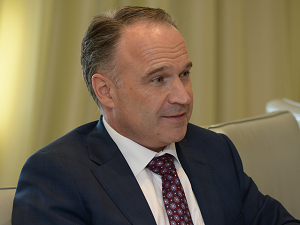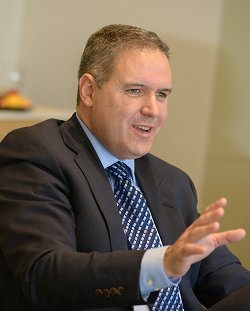Editor's note: One year after the election of Donald Trump, we bring together four U.S. equity managers to look back on a period of rising stock prices and robust GDP growth, and look forward to what investors in the world's largest equity market can expect in the year ahead.
The managers:
Jim Young, vice-president at Invesco Canada Ltd. He is responsible for Trimark U.S. Companies and Trimark U.S. Companies Class.
Glenn Fortin, vice-president at Beutel Goodman & Co. Ltd. A specialist in U.S. equities, Fortin is a member of the firm's U.S. and global equity team. Its mandates include Beutel Goodman American Equity.
David Pearl, executive vice-president and co-chief investment officer at New York-based Epoch Investment Partners, Inc., which manages assets for TD Asset Management Inc. and CI Investments Inc. Funds managed include Epoch U.S. Large-Cap Value under the TD banner, and CI American Value.
Jonathan Norwood, senior vice-president and portfolio manager on the Mackenzie Cundill team at Mackenzie Investments. His mandates include Mackenzie Cundill U.S. Class.
This week's coverage of the roundtable, which was convened and moderated by Sonita Horvitch, continues on Wednesday and concludes on Friday.
Q: The U.S. equity market continues to roar ahead and make new highs. The S&P 500 Index's total return for the first 10 months of 2017 was 16.9% and for the 12 months to the end of October it was 23.6%. How long can this bull market last? What about valuations?
Young: The U.S. equity market has done well for a number of years. This is partly because it started from a low base. The economies around the world are finally improving. Europe and Asia have picked up and the U.S. economy is growing a little faster. The market should continue to move with earnings, which I expect to be good for the next couple of years. There is unlikely to be additional multiple expansion. But investors have spent the last five years switching out of equities into bonds. If there is a flow of funds back into equities, valuations could go higher.
 |
|
 |
|
| Jim Young | |
 |
|
 |
|
 |
Pearl: The last GDP (gross domestic product) number for the United States was 3%. We have not seen this in more than a decade. The U.S. economy is starting to accelerate. It is an unusually long economic recovery. Recoveries do not die of old age. They die because the economy becomes overheated, which causes central banks to have to slow things down. U.S. inflation is quite moderate. The U.S. Federal Reserve Board has been slowly raising its federal funds rate, and is likely to continue to do so. The key drivers of the market will be growth of corporate profits and return of capital to shareholders. U.S. GDP growth at 3%, would, with some productivity growth, lead to corporate profit growth in the mid-single-digit range. Add return of capital and you are in the high single digits. This would lead to a historically average return from the U.S. equity market, but it is a good return relative to investors' other prospects.
Fortin: Looking at the risk to the U.S. equity market, we should be aware that corporate balance sheets are extended. Companies have taken advantage of the low interest-rate environment. If the economy does turn down, this could present a problem. If things get bad for individual companies, then they still have that expanded balance sheet to contend with. We are seeing some signs of this, but the overall environment remains positive.
Norwood: It has been a lengthy U.S. economic recovery. People compare this U.S. equity bull market to the length of bull markets in the past. This bull market is undoubtedly among the longest historically, but the economic recovery has not been a conventional one.
Q: We chose to hold our U.S. equity roundtable in November, one year after the election of President Donald Trump.
 |
|
 |
|
| Glenn Fortin | |
 |
|
 |
|
 |
Pearl: The policy, under Trump, has been pro-business, pro-growth and pro-jobs. Consumer confidence is at an all-time high and business confidence is close to an all-time high. Small-business confidence is at an all-time high.
After the global financial crisis, small businesses created zero jobs. In the United States, small business is the biggest creator of jobs. Since the election of Donald Trump, they have started to hire again. There has been a relaxation of regulation. The U.S. unemployment rate is low. The last employment number was the best month for people without a college degree. Trump is following through on his number one priority, to bring jobs back to those people.
One thing that Republicans agree upon is cutting taxes. They cannot go back for re-election in 2018, the mid-term elections, without having accomplished that. The move will include a tax break for companies holding profits overseas. This will help a number of companies, including the big-cap tech companies. The banks have some of the highest tax rates. They too will benefit from a tax cut.
 |
|
 |
|
| David Pearl | |
 |
|
 |
|
 |
Young: The nomination by Trump of Jerome Powell as the next U.S. Federal Reserve Board chair represents a continuity of strategy. Interest rates will continue to go up in line with accelerating economic activity and the Fed will gradually move away from the quantitative strategy of the past.
Fortin: It was a conservative choice.
Norwood: A federal funds rate hike in December is baked into the bond market.
Q: Can we return to our discussion on the U.S. market's performance in the first 10 months of 2017?
Norwood: It is important to point out that the equity-market leadership has been very narrow so far this year. Looking at the S&P 500 Index, probably some 40% of the return to the end of October has come from 10 stocks. We are deep-value managers. We do not own them. It has been a growth and momentum year in the market. When a small group of mega-cap technology stocks trade at nosebleed multiples, it is challenging for value managers.
 |
|
 |
|
| Jonathan Norwood | |
 |
|
 |
|
 |
But there is some good news for value managers. The U.S. energy sector is starting to come back. Most value managers are overweight energy. Then there is the prospect of tax reform. A lot of value managers own big free-cash-flow generating domestic companies in areas such as health care, consumer-related companies and banks. They will benefit.
Q: Information technology has had a bumper year so far. It represented 24.5% of the S&P 500 Index at the end of October and the sector produced a total return of 37.2% in the first 10 months of 2017. Are we experiencing a tech bubble?
Young: In a world that changes quickly, if companies want sustainable growth, they have to be innovative. This has been an overarching investing theme for us. For a number of years, investors were suspicious of growth and they crowded into those companies that had obvious growth like ![]() Facebook Inc. (FB) and
Facebook Inc. (FB) and ![]() Amazon.com Inc. (AMZN). They did not worry much about the valuation. We are valuation-conscious. We do not own those two stocks. We have a decent position in
Amazon.com Inc. (AMZN). They did not worry much about the valuation. We are valuation-conscious. We do not own those two stocks. We have a decent position in ![]() Alphabet Inc. Class A (GOOGL) and
Alphabet Inc. Class A (GOOGL) and ![]() Alphabet Inc. Class C (GOOG). You can make the case that the Google stocks are not that expensive. The same is true for
Alphabet Inc. Class C (GOOG). You can make the case that the Google stocks are not that expensive. The same is true for ![]() Microsoft Corp. (MSFT), which has a tremendous entrenched position with its customers, and
Microsoft Corp. (MSFT), which has a tremendous entrenched position with its customers, and ![]() Apple Inc. (AAPL). We own both stocks. Apple has a sticky business model and high margins. It continues to innovate. We also own a few semiconductor companies. The stocks are doing well. The digitization of society has broadened the demand for semiconductors in general. We think the technology sector will continue to do well.
Apple Inc. (AAPL). We own both stocks. Apple has a sticky business model and high margins. It continues to innovate. We also own a few semiconductor companies. The stocks are doing well. The digitization of society has broadened the demand for semiconductors in general. We think the technology sector will continue to do well.
| Alphabet Inc. Class A | Apple Inc. | Microsoft Corp. | |
 |
|||
| Nov. 16 close | $1048.47 | $171.10 | $83.20 |
 |
|||
| 52-week high/low | $1063.62-$753.36 | $176.24-$108.25 | $86.20-$58.80 |
 |
|||
| Market cap | $724.7 billion | $874.9 billion | $636.0 billion |
 |
|||
| Total % return 1Y* | 34.4 | 57.8 | 42.2 |
 |
|||
| Total % return 3Y* | 23.6 | 15.9 | 21.0 |
 |
|||
| Total % return 5Y* | 20.0 | 19.2 | 27.6 |
 |
|||
 |
|||
| *As of Nov. 16, 2017. All figures in U.S. dollars Source: Morningstar |
|||
Pearl: There are cyclical changes in technology and secular changes, like moving to the Cloud, that drive different tech companies. For Microsoft, in particular, it is the Cloud. It is a growth business. Microsoft is number two in the Cloud and is gaining market share from Amazon. We own Microsoft. It has transformed from a consumer-oriented company to an enterprise-focused company.
Fortin: We like enterprise-focused tech companies.
Pearl: On the other hand, Apple benefits because the cellphone has become everyone's computing device. We own the stock; we have owned it for 10 years. Apple is one of the only companies to make profits on cellphones. The stocks of Microsoft and Apple are both selling at a discount.
We are free-cash-flow investors. We distinguish between those companies that make money and those that do not. Amazon does not make money. ![]() Netflix Inc. (NFLX) is burning cash and could go out of business this year if it does not borrow money.
Netflix Inc. (NFLX) is burning cash and could go out of business this year if it does not borrow money. ![]() Tesla Inc. (TSLA), which could be considered to be a technology company, had to borrow money at a fairly high interest rate. Yet those stocks have been good performers.
Tesla Inc. (TSLA), which could be considered to be a technology company, had to borrow money at a fairly high interest rate. Yet those stocks have been good performers.
Photos: Paul Lawrence Photography


















